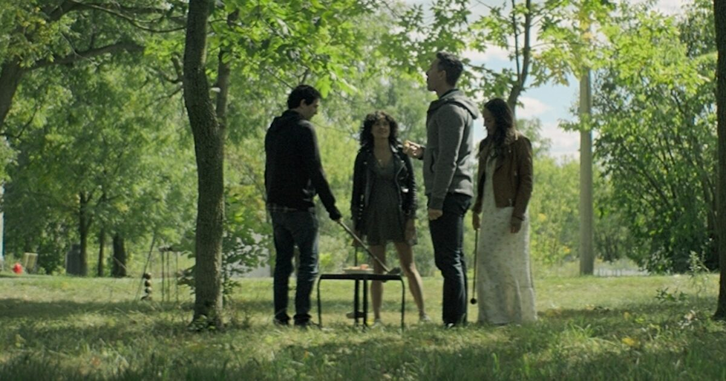MOVIES (GFF 2022): Ashgrove - Review
Mar 4, 2022
MJ Movies ReviewsAshgrove casts a rare spin on the post-apocalyptic genre movie, a surprisingly low-key film that substitutes the current pandemic for a fictional one, where in this reality, water is the enemy – if you drink too much, you will die, but you still have to drink it to survive. Balance is the key to survive, and this neat little film from Jeremy Lalonde plunges you into a world that feels reminiscent of Mike Cahill’s Another Earth or Jeff Nichols’ Midnight Special, opting for a human focus on our principal character, Amanda Brugel’s Jennifer – who is one of the world’s top water scientists - even if it pales in comparison to all, offering up something of a snooze-fest.
The film is as much about Jennifer’s home life and the need for escape as it is a plot, finding a neat divide between both, taking its cues from The Leftovers in the sense that it is more about the people living in this world that they now have rather than focusing on how to return it to normal, at least for the first half of the film. The soundtrack is quirky, indie and upbeat, mixed in with diegetic music with one of the characters who we meet early on spending time on the ukulele. The film has a way of character-building from the get go those eases you into this rich world, full of surprise that constantly find a way to keep you on edge too, but spends time in the quieter moments.
There’s a hint of tension forming between Jennifer and Jonas Chernick’s Jason that threatens to boil over – they’re establishing new rules in their relationship and the film takes its time to focus on both of them, not substituting one in favour of the other as they argue over small things like salad making. Perhaps the most refreshing thing of all is that how relatively low-key Ashgrove feels, a relative focus on normalcy in a pandemic almost feels welcome – a more high-stakes movie would have felt showy and that's why the second half feels more convoluted than the first as it's caught up in its own twist and trying to out-think the audience and be a touch too clever.
The tension is there whenever water is evident and whenever Jennifer’s job is brought up given how much pressure she’s under – she’s literally tasked with saving the world - and the film hones in on the calmness in-between these moments, with the ukulele almost feeling like a third main character given its background usage, at least early on – and how little other characters are present for a good portion of the first act, and then Ashgrove shakes things up again just when you think its schtick is getting tiring, dropping a major bomb that changes everything. It’s helped that its run doesn’t overstay its welcome – 93 minutes is a lean, well-paced, well-structured fare, with its third act raising the stakes again tapping into very well realised fears of paranoia.
Like films like Ben Wheatley’s In the Earth and Steven Soderbergh’s Kimi, Ashgrove manages to be a movie that touches on the current COVID-19 pandemic without actually being about the current COVID-19 pandemic. Its focus on connection and the rediscovery of human moments – both the good and the bad - gives it a poignant, reflective – inner-looking feel even if what it does with those moments can feel familiar at times and its ending can feel maybe a tad too understated even given the film’s general mission statement.


